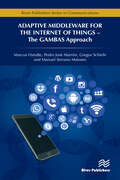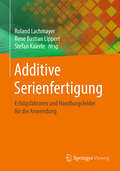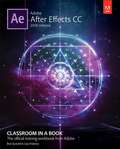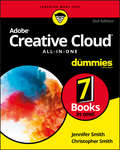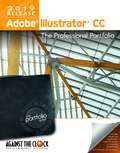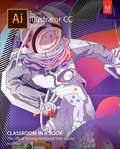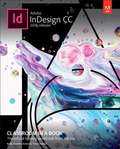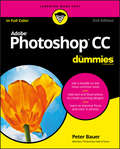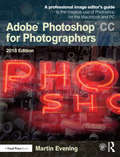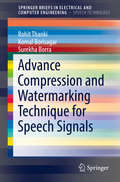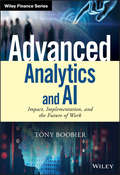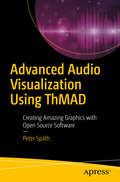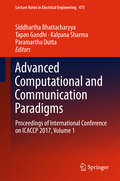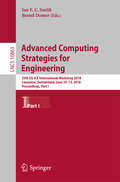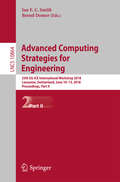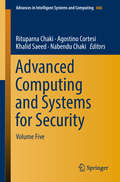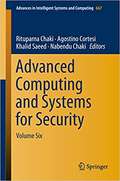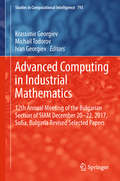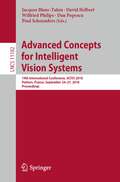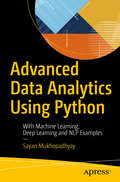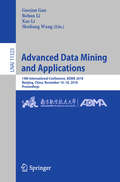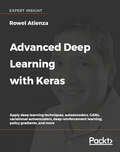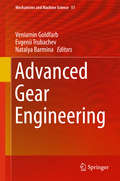- Table View
- List View
Adaptive Middleware for the Internet of Things: The GAMBAS Approach
by Pedro José Marrón Gregor Schiele Marcus Handte Matoses Manuel SerranoOver the past years, a considerable amount of effort has been devoted, both in industry and academia, towards the development of basic technology as well as innovative applications for the Internet of Things. Adaptive Middleware for the Internet of Things introduces a scalable, interoperable and privacy-preserving approach to realize IoT applications and discusses abstractions and mechanisms at the middleware level that simplify the realization of services that can adapt autonomously to the behavior of their users. Technical topics discussed in the book include:Behavior-driven Autonomous ServicesGAMBAS Middleware ArchitectureGeneric and Efficient Data AcquisitionInteroperable and Scalable Data ProcessingAutomated Privacy PreservationAdaptive Middleware for the Internet of Things summarizes the results of the GAMBAS research project funded by the European Commission under Framework Programme 7. It provides an in-depth description of the middleware system developed by the project consortium. In addition, the book describes several innovative mobility and monitoring applications that have been built, deployed and operated to evaluate the middleware under realistic conditions with a large number of users. Adaptive Middleware for the Internet of Things is ideal for personnel in the computer and communication industries as well as academic staff and research students in computer science interested in the development of systems and applications for the Internet of Things.
Additive Serienfertigung: Erfolgsfaktoren und Handlungsfelder für die Anwendung
by Roland Lachmayer Rene Bastian Lippert Stefan KaierleBei der additiven Fertigung wird anders als bei konventionellen Verfahren ein Bauteil nicht aus einem Block herausgefräst oder in einem Werkzeug gegossen, sondern es wird Schicht für Schicht generiert. Dieses Buch stellt eine Vielzahl verschiedener Aspekte der additiven Fertigung vor und erläutert anhand von Praxisbeispielen die Anwendungen und die Potenziale der Verfahren für eine Serienfertigung: Wo und wie kann die additive Fertigung erfolgreich eingesetzt werden?Die Autoren zeigen vor dem Hintergrund eines ganzheitlichen Entwicklungs- und Fertigungsprozesses mögliche Geschäftsmodelle auf, unter anderem die Fertigung in Microfactories. Leser erfahren, wie sich die Fertigungszeit und -kosten vorhersagen lassen, wie zuverlässig additiv gefertigte Strukturbauteile sind und inwieweit additive Fertigungsverfahren für die Herstellung von Endprodukten geeignet sind.Ferner diskutieren die Autoren, wie Pre- und Post-Prozesse genutzt werden können, um Serienanwendungen zu etablieren und diese iterativ zu verbessern. Neben den Möglichkeiten zur Qualitätssicherung bei der additiven Serienfertigung wird erläutert, wann es sinnvoll sein kann, konventionelle Fertigungsverfahren durch hybride Ansätze zu ergänzen. Die additive Instandsetzung als Alternative zum Entsorgen von verschlissenen Bauteilen wird ebenfalls erörtert. Im Hinblick auf eine Effizienzsteigerung diskutieren die Autoren Sicherheitsaspekte und legen Lösungsansätze bei Problemen im Umgang mit der additiven Serienfertigung dar.
Adobe After Effects CC (Classroom In A Book )
by Lisa Fridsma Brie GyncildAdobe After Effects CC Classroom in a Book (2018 release) is part of the official training series for Adobe graphics and publishing software, developed with the support of Adobe product experts. The lessons are designed to let you learn at your own pace. <P><P>If you're new to Adobe After Effects, you'll learn the fundamental concepts and features you'll need to master the program. And if you've been using Adobe After Effects for a while, you'll find that Classroom in a Book teaches many advanced features, including tips and techniques for using the latest version. <P><P>Although each lesson provides step-by-step instructions for creating a specific-project, there's room for exploration and experimentation. You can follow the book from start to finish, or do only the lessons that match your interests and needs. Each lesson concludes with a review section summarizing what you've covered.
Adobe Audition Cc Classroom In A Book (Classroom In A Book)
by Maxim Jago Adobe Creative Adobe Creative TeamAdobe Audition CC Classroom in a Book contains 17 lessons that cover the basics and beyond, providing countless tips and techniques to help you become more productive with the program. You can follow the book from start to finish or choose only those lessons that interest you.
Adobe Creative Cloud All-in-One For Dummies
by Jennifer Smith Christopher SmithGet ready to jump into the Creative Cloud Adobe Creative Cloud is the most popular suite of tools among creative professionals, and a valuable resource you can use to fulfill all of your design goals. Ready to get started? The only book on the market of its kind, Adobe Creative Cloud All-in-One For Dummies is written by designers for designers. It will provide you with expert instruction that spans seven mini-books, with helpful information that can grant insight regardless of your current level of knowledge. Experience with Adobe Creative Cloud is a marketable skill, and this all-in-one reference guide will help you add InDesign CC, Illustrator CC, Photoshop CC, Acrobat Pro, Adobe Bridge, and Adobe Experience Design to your resume. With more than 800 pages of content, this detailed guide will give you confidence you need to use Adobe photography and graphic design tools to edit photos, make original designs and layouts, and let your creativity shine with Adobe Creative Cloud. Learn design basics and utilize more advanced features Protect your documents with Acrobat Pro Find tips and tricks to make each program work better From 3D images and vivid illustrations to dynamic web pages and interactive effects, Adobe Creative Cloud All-in-One For Dummies shows you how to do it all!
Adobe Dreamweaver CC 2019: The Professional Portfolio
by Against The Clock Erika KendraAdobe Dreamweaver CC 2019: The Professional Portfolio
Adobe Illustrator CC (Classroom In A Book)
by Brian WoodAdobe Illustrator CC Classroom in a Book® (2018 release) is part of the official training series for Adobe graphics and publishing software developed with the support of Adobe product experts. The features and exercises in this book are based on Illustrator CC (2018 release). <p><p> The lessons are designed so that you can learn at your own pace. If you're new to Adobe Illustrator, you'll learn the fundamentals you need to master to put the application to work. If you are an experienced user, you'll find that Classroom in a Book® teaches many advanced features, including tips and techniques for using the latest version of Adobe Illustrator. <p> Although each lesson provides step-by-step instructions for creating a specific project, there's room for exploration and experimentation. You can follow the book from start to finish or do only the lessons that correspond to your interests and needs. Each lesson concludes with a review section to quiz you on what was covered.
Adobe Indesign CC Classroom In A Book (2018 Release)
by Kelly Kordes Anton Tina DeJarldClassroom in a Book®, the best-selling series of hands-on software training workbooks, offers what no other book or training program does—an official training series from Adobe Systems Incorporated, developed with the support of Adobe product experts. Adobe InDesign CC Classroom in a Book contains 16 lessons that cover the basics, providing countless tips and techniques to help you become more productive with the program. You can follow the book from start to finish or choose only those lessons that interest you.
Adobe Photoshop CC Classroom in a Book (Classroom in a Book Ser.)
by Andrew Faulkner Conrad ChavezCreative professionals seeking the fastest, easiest, most comprehensive way to learn Adobe Photoshop choose Adobe Photoshop CC Classroom in a Book (2018 release) from Adobe Press. The 15 project-based lessons show key step-by-step techniques for working in Photoshop, including how to correct, enhance, and distort digital images, create image composites, and prepare images for print and the web. <P><P>In addition to learning the essential elements of the Photoshop interface, this revised edition for the 2018 release covers features like search capabilities, Content-Aware Crop, Select and Mask, Face-Aware Liquify, designing with multiple artboards, creating and organizing enhanced brush presets, and much more! <P><P>The online companion files include all the necessary assets for readers to complete the projects featured in each chapter as well as ebook updates when Adobe releases relevant new features for Creative Cloud customers. All buyers of the book get full access to the Web Edition: a Web-based version of the complete ebook enhanced with video and multiple-choice quizzes.
Adobe Photoshop CC For Dummies
by Peter BauerThe fast and easy way to grasp Photoshop CC essentials Photoshop is the gold standard when it comes to photo and image editing tools. But unless you've ever taken a class or gotten help from a Photoshop guru, you may find yourself a bit confused on where to start and how to get things done. Photoshop CC For Dummies, 2nd Edition is the book for those of us who don't know a layer from a level and just want to learn how to make photos look better. This update to Photoshop CC For Dummies, the first since the product launched, packs an even more powerful punch to help you manage and enhance your images. In Photoshop CC For Dummies, 2nd Edition you'll find clear explanations of the menus, panels, tools, options, and shortcuts you'll use the most. Plus, you'll discover invaluable tips for fixing common photo flaws, improving color quality, adjusting brightness, removing unwanted background elements, and more. Whether you want to improve how your family photos look or need to add a new skillset to your resume, this friendly guide gives you all the steps to navigating the software and getting top-notch results. Get a handle on the most common tools Improve focus and color in photos Add text and illustrations to create stunning graphics Find insider tips and tricks the pros use The sky's the limit for stunning photos and innovative images when you have Photoshop CC For Dummies, 2nd Edition in your design toolbox!
Adobe Photoshop CC for Photographers 2018: A Professional Image Editor's Guide To The Creative Use Of Photoshop For The Macintosh And Pc
by Martin EveningAdobe Photoshop CC for Photographers by acclaimed digital imaging professional Martin Evening has been revamped to include detailed instruction for all of the updates to Photoshop CC on Adobe’s Creative Cloud, including significant new features, such as the painting tool and Pen path tool refinements and Range Masking in Camera Raw. This guide covers all the tools and techniques photographers and professional image editors need to know when using Photoshop, from workflow guidance to core skills to advanced techniques for professional results. Using clear, succinct instruction and real world examples, this guide is the essential reference for Photoshop users. The accompanying website has been updated with new sample images, tutorial videos, and bonus chapters.
Advance Compression and Watermarking Technique for Speech Signals (SpringerBriefs in Speech Technology)
by Rohit Thanki Komal Borisagar Surekha BorraThis book introduces methods for copyright protection and compression for speech signals. The first method introduces copyright protection of speech signal using watermarking; the second introduces compression of the speech signal using Compressive Sensing (CS). Both methods are tested and analyzed. The speech watermarking method uses technology such as Finite Ridgelet Transform (FRT), Discrete Wavelet Transform (DWT) and Singular Value Decomposition (SVD). The performance of the method is evaluated and compared with existing watermarking methods. In the speech compression method, the standard Compressive Sensing (CS) process is used for compression of the speech signal. The performance of the proposed method is evaluated using various transform bases like Discrete Fourier Transform (DFT), Discrete Cosine Transform (DCT), Discrete Wavelet Transform (DWT), Singular Value Decomposition (SVD), and Fast Discrete Curvelet Transform (FDCuT).
Advanced Analytics and AI: Impact, Implementation, and the Future of Work (Wiley Finance)
by Tony BoobierBe prepared for the arrival of automated decision making Once thought of as science fiction, major corporations are already beginning to use cognitive systems to assist in providing wealth advice and also in medication treatment. The use of Cognitive Analytics/Artificial Intelligence (AI) Systems is set to accelerate, with the expectation that it’ll be considered ‘mainstream’ in the next 5 – 10 years. It’ll change the way we as individuals interact with data and systems—and the way we run our businesses. Cognitive Analysis and AI prepares business users for the era of cognitive analytics / artificial intelligence. Building on established texts and commentary, it specifically prepares you in terms of expectation, impact on personal roles, and responsibilities. It focuses on the specific impact on key industries (retail, financial services, utilities and media) and also on key professions (such as accounting, operational management, supply chain and risk management). Shows you how users interact with the system in natural language Explains how cognitive analysis/AI can source ‘big data’ Provides a roadmap for implementation Gets you up to speed now before you get left behind If you’re a decision maker or budget holder within the corporate context, this invaluable book helps you gain an advantage from the deployment of cognitive analytics tools.
Advanced Audio Visualization Using ThMAD: Creating Amazing Graphics with Open Source Software
by Peter SpäthLearn advanced techniques and improve your audio visualization skills with Thinking Machine Audio Dreams (ThMAD). With this book, you can concentrate on advanced examples and usage patterns, including using shaders in a more profound way, and how to incorporate ThMAD into a tool chain using the professional sound server JACK.
Advanced Computational and Communication Paradigms: Proceedings of International Conference on ICACCP 2017, Volume 1 (Lecture Notes in Electrical Engineering #475)
by Kalpana Sharma Siddhartha Bhattacharyya Paramartha Dutta Tapan GandhiThe book titled Advanced Computational and Communication Paradigms: Proceedings of International Conference on ICACCP 2017, Volume 1 presents refereed high-quality papers of the First International Conference on Advanced Computational and Communication Paradigms (ICACCP 2017) organized by the Department of Computer Science and Engineering, Sikkim Manipal Institute of Technology, held from 8– 10 September 2017. ICACCP 2017 covers an advanced computational paradigms and communications technique which provides failsafe and robust solutions to the emerging problems faced by mankind. Technologists, scientists, industry professionals and research scholars from regional, national and international levels are invited to present their original unpublished work in this conference. There were about 550 technical paper submitted. Finally after peer review, 142 high-quality papers have been accepted and registered for oral presentation which held across 09 general sessions and 05 special sessions along with 04 keynote address and 06 invited talks. This volume comprises 65 accepted papers of ICACCP 2017.
Advanced Computing Strategies for Engineering: 25th EG-ICE International Workshop 2018, Lausanne, Switzerland, June 10-13, 2018, Proceedings, Part I (Lecture Notes in Computer Science #10863)
by Ian F. Smith Bernd DomerThis double volume set ( LNAI 10863-10864) constitutes the refereed proceedings of the 25th International Workshop, EG-ICE 2018, held in Lausanne, Switzerland, in June 2018. The 58 papers presented in this volume were carefully reviewed and selected from 108 submissions. The papers are organized in topical sections on Advanced Computing in Engineering, Computer Supported Construction Management, Life-Cycle Design Support, Monitoring and Control Algorithms in Engineering, and BIM and Engineering Ontologies.
Advanced Computing Strategies for Engineering: 25th EG-ICE International Workshop 2018, Lausanne, Switzerland, June 10-13, 2018, Proceedings, Part II (Lecture Notes in Computer Science #10864)
by Ian F. Smith Bernd DomerThis double volume set ( LNAI 10863-10864) constitutes the refereed proceedings of the 25th International Workshop, EG-ICE 2018, held in Lausanne, Switzerland, in June 2018. The 58 papers presented in this volume were carefully reviewed and selected from 108 submissions. The papers are organized in topical sections on Advanced Computing in Engineering, Computer Supported Construction Management, Life-Cycle Design Support, Monitoring and Control Algorithms in Engineering, and BIM and Engineering Ontologies.
Advanced Computing and Systems for Security: Volume 5 (Advances In Intelligent Systems And Computing #666)
by Khalid Saeed Nabendu Chaki Agostino Cortesi Rituparna ChakiDiscusses recent research trends in the areas of computational intelligence, communications, data mining, and computational models.<P><P> Presents applications to design, analysis, and modeling for key areas in computational intelligence.<P> Discusses efficient computational algorithms and robust tools for efficient implementation.<P> This book contains extended version of selected works that have been discussed and presented in the fourth International Doctoral Symposium on Applied Computation and Security Systems (ACSS 2017) held in Patna, India during March 17-19, 2017. The symposium was organized by the Departments of Computer Science & Engineering and A. K. Choudhury School of Information Technology, both from University of Calcutta in collaboration with NIT, Patna. The International partners for ACSS 2016 had been Ca Foscari University of Venice, Italy and Bialystok University of Technology, Poland.<P> This bi-volume book has a total of 21 papers divided in 7 chapters. The chapters reflect the sessions in which the works have been discussed during the symposium. The different chapters in the book include works on biometrics, image processing, pattern recognition, algorithms, cloud computing, wireless sensor networks and security systems.
Advanced Computing and Systems for Security: Volume 6 (Advances In Intelligent Systems And Computing #667)
by Khalid Saeed Nabendu Chaki Agostino Cortesi Rituparna ChakiDiscusses recent research trends in the areas of computational intelligence, communications, data mining, and computational models.<P><P> Presents applications to design, analysis, and modeling for key areas in computational intelligence.<P> Discusses efficient computational algorithms and robust tools for efficient implementation.<P> This book contains extended version of selected works that have been discussed and presented in the fourth International Doctoral Symposium on Applied Computation and Security Systems (ACSS 2017) held in Patna, India during March 17-19, 2017. The symposium was organized by the Departments of Computer Science & Engineering and A. K. Choudhury School of Information Technology, both from University of Calcutta in collaboration with NIT, Patna. The International partners for ACSS 2016 had been Ca Foscari University of Venice, Italy and Bialystok University of Technology, Poland.<P> This bi-volume book has a total of 21 papers divided in 7 chapters. The chapters reflect the sessions in which the works have been discussed during the symposium. The different chapters in the book include works on biometrics, image processing, pattern recognition, algorithms, cloud computing, wireless sensor networks and security systems.
Advanced Computing in Industrial Mathematics: 11th Annual Meeting Of The Bulgarian Section Of Siam December 20-22, 2016, Sofia, Bulgaria. Revised Selected Papers (Studies in Computational Intelligence #728)
by Krassimir Georgiev Michail Todorov Ivan GeorgievThis book gathers the peer-reviewed proceedings of the 12th Annual Meeting of the Bulgarian Section of the Society for Industrial and Applied Mathematics, BGSIAM’17, held in Sofia, Bulgaria, in December 2017. The general theme of BGSIAM’17 was industrial and applied mathematics, with a particular focus on: high-performance computing, numerical methods and algorithms, analysis of partial differential equations and their applications, mathematical biology, control and uncertain systems, stochastic models, molecular dynamics, neural networks, genetic algorithms, metaheuristics for optimization problems, generalized nets, and Big Data.
Advanced Concepts for Intelligent Vision Systems: 19th International Conference, ACIVS 2018, Poitiers, France, September 24–27, 2018, Proceedings (Lecture Notes in Computer Science #11182)
by Jacques Blanc-Talon Wilfried Philips Dan Popescu Paul Scheunders David HelbertThis book constitutes the refereed proceedings of the 19th International Conference on Advanced Concepts for Intelligent Vision Systems, ACIVS 2018, held in Poitiers, France, in September 2018. The 52 full papers presented in this volume were carefully reviewed and selected from 91 submissions. They were organized in topical sections named: video analysis; segmentation and classification; remote sending; biometrics; deep learning; coding and compression; and image restauration and reconstruction.
Advanced Data Analytics Using Python: With Machine Learning, Deep Learning and NLP Examples
by Sayan MukhopadhyayGain a broad foundation of advanced data analytics concepts and discover the recent revolution in databases such as Neo4j, Elasticsearch, and MongoDB. This book discusses how to implement ETL techniques including topical crawling, which is applied in domains such as high-frequency algorithmic trading and goal-oriented dialog systems. You’ll also see examples of machine learning concepts such as semi-supervised learning, deep learning, and NLP. Advanced Data Analytics Using Python also covers important traditional data analysis techniques such as time series and principal component analysis. <p><p> After reading this book you will have experience of every technical aspect of an analytics project. You’ll get to know the concepts using Python code, giving you samples to use in your own projects.
Advanced Data Mining and Applications: 14th International Conference, ADMA 2018, Nanjing, China, November 16–18, 2018, Proceedings (Lecture Notes in Computer Science #11323)
by Guojun Gan Shuliang Wang Xue Li Bohan LiThis book constitutes the refereed proceedings of the 14th International Conference on Advanced Data Mining and Applications, ADMA 2018, held in Nanjing, China in November 2018. The 23 full and 22 short papers presented in this volume were carefully reviewed and selected from 104 submissions. The papers were organized in topical sections named: Data Mining Foundations; Big Data; Text and Multimedia Mining; Miscellaneous Topics.
Advanced Deep Learning with Keras: Apply deep learning techniques, autoencoders, GANs, variational autoencoders, deep reinforcement learning, policy gradients, and more
by Rowel AtienzaUnderstanding and coding advanced deep learning algorithms with the most intuitive deep learning library in existenceKey FeaturesExplore the most advanced deep learning techniques that drive modern AI resultsImplement deep neural networks, autoencoders, GANs, VAEs, and deep reinforcement learningA wide study of GANs, including Improved GANs, Cross-Domain GANs, and Disentangled Representation GANsBook DescriptionRecent developments in deep learning, including Generative Adversarial Networks (GANs), Variational Autoencoders (VAEs), and Deep Reinforcement Learning (DRL) are creating impressive AI results in our news headlines - such as AlphaGo Zero beating world chess champions, and generative AI that can create art paintings that sell for over $400k because they are so human-like. Advanced Deep Learning with Keras is a comprehensive guide to the advanced deep learning techniques available today, so you can create your own cutting-edge AI. Using Keras as an open-source deep learning library, you'll find hands-on projects throughout that show you how to create more effective AI with the latest techniques. The journey begins with an overview of MLPs, CNNs, and RNNs, which are the building blocks for the more advanced techniques in the book. You’ll learn how to implement deep learning models with Keras and TensorFlow 1.x, and move forwards to advanced techniques, as you explore deep neural network architectures, including ResNet and DenseNet, and how to create autoencoders. You then learn all about GANs, and how they can open new levels of AI performance. Next, you’ll get up to speed with how VAEs are implemented, and you’ll see how GANs and VAEs have the generative power to synthesize data that can be extremely convincing to humans - a major stride forward for modern AI. To complete this set of advanced techniques, you'll learn how to implement DRL such as Deep Q-Learning and Policy Gradient Methods, which are critical to many modern results in AI.What you will learnCutting-edge techniques in human-like AI performanceImplement advanced deep learning models using KerasThe building blocks for advanced techniques - MLPs, CNNs, and RNNsDeep neural networks – ResNet and DenseNetAutoencoders and Variational Autoencoders (VAEs)Generative Adversarial Networks (GANs) and creative AI techniquesDisentangled Representation GANs, and Cross-Domain GANsDeep reinforcement learning methods and implementationProduce industry-standard applications using OpenAI GymDeep Q-Learning and Policy Gradient MethodsWho this book is forSome fluency with Python is assumed. As an advanced book, you'll be familiar with some machine learning approaches, and some practical experience with DL will be helpful. Knowledge of Keras or TensorFlow 1.x is not required but would be helpful.
Advanced Gear Engineering (Mechanisms and Machine Science #51)
by Veniamin Goldfarb Natalya Barmina Evgenii TrubachevThis book covers recent developments in practically all spheres of mechanical engineering related to different kinds of gears and transmissions. Topics treated range from fundamental research to the advanced applications of gears in various practical fields, prospects of manufacturing development, results and trends of numerical and experimental research of gears, new approaches to gear design and aspects of their optimization synthesis.
